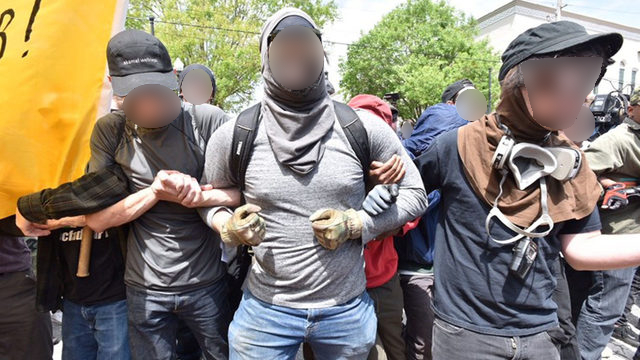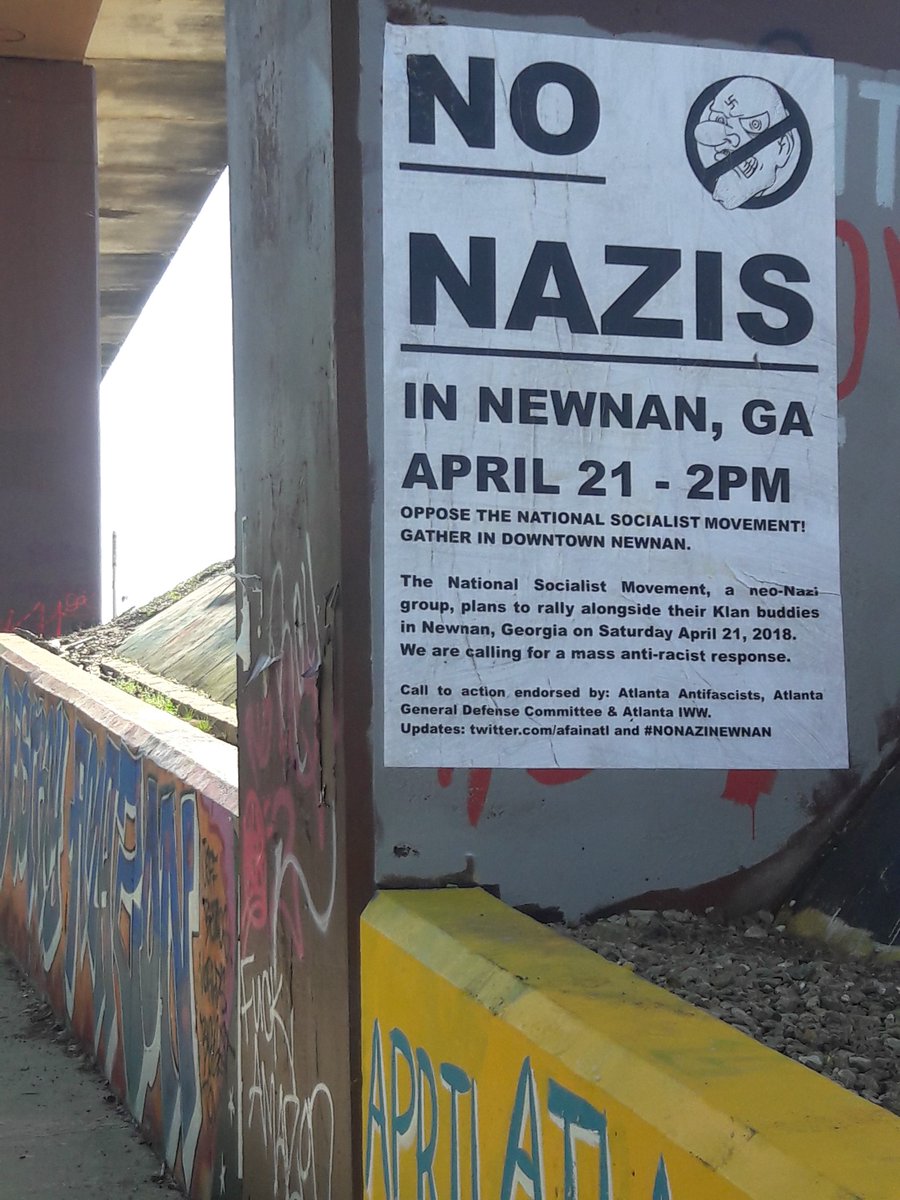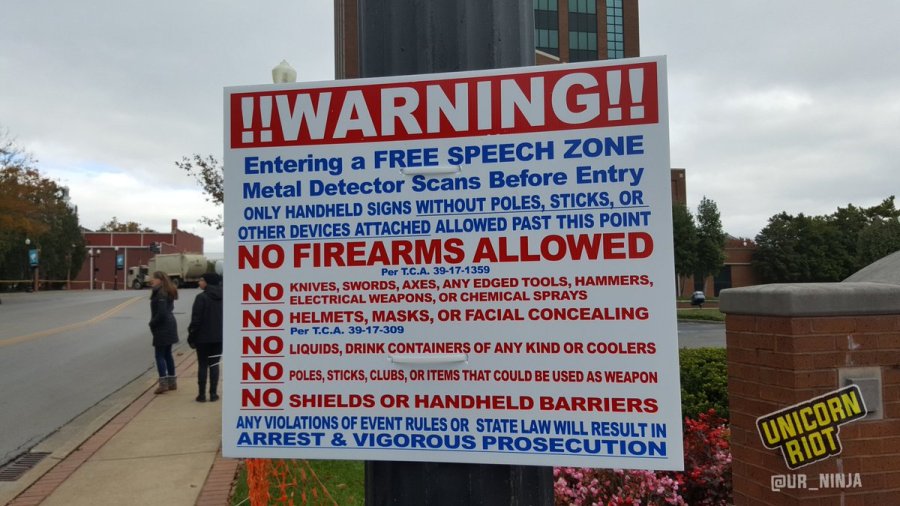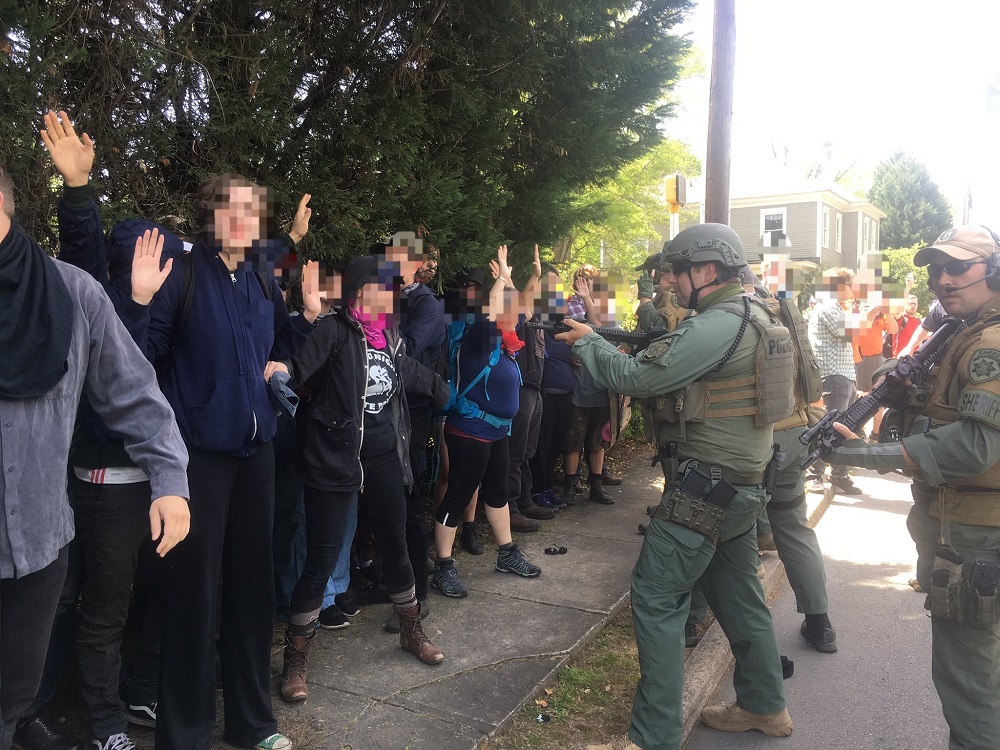Introduction
On April 21, 2018, the National Socialist Movement (NSM) held a small rally at the Greenville Street Park in Newnan, Georgia, 45 minutes southwest of Atlanta. The NSM’s application to use the Park — accepted by the City of Newnan for $50 — stated that the Nazi organization would bring fifty to a hundred participants for its white power rally. This was expected to be one of the largest displays of open white supremacists since the bloody “Unite the Right” rally in Charlottesville, Virginia last year. In the end, the NSM attracted approximately half its minimum projected attendance and was protested by several hundred. To create conditions for the NSM event to take place, the entire City of Newnan was militarized, with approximately 700 police from various agencies swamping the City, mobilizing a large number of military surplus vehicles, then brutalizing and arresting anti-racist protesters. We are proud of the anti-racist protesters in Newnan on Saturday. Both “antifa” and other anti-racists continued to protest even as police pointed guns at them for no apparent reason, and repeatedly charged into the #NoNaziNewnan anti-racist assembly to violently arrest demonstrators. Further, the large organized presence from the Black community in Coweta County — visible directly across the street from the Nazi rally — was inspiring. The NSM event flopped. Anti-racists and anti-fascists have much to be pleased with from the 21st, despite the fresh instances of repression which we must now address. State displays of force such as we witnessed in Newnan seem increasingly likely as anti-fascists move forward in the South. The same is probably true throughout the US. In our conclusion, we will briefly discuss ramifications of this changed strategic situation.
Lead-up to April 21st and the #NoNaziNewnan Coalition
Since February, we were aware that the neo-Nazis of the National Socialist Movement would hold their annual national meeting in Georgia this April. When they first announced the national meeting, the NSM provided the location of “Temple, Georgia” for their event, making clear that they would once again use the Klan/white supremacist-friendly Georgia Peach Oyster Bar in Draketown (near Temple) as a venue. (This venue is approximately 45 mins – one hour west of Atlanta.) The NSM announced only later that it would have a Saturday public rally in Newnan, Georgia, about an hour away from the Peach. (In 2016, the NSM also had a national meeting at the Georgia Peach, accompanying it with a public rally in Rome, Georgia which is north of the venue.)
As soon as the story of a white supremacist rally in Newnan appeared, City of Newnan authorities set to work discouraging residents from protesting or going downtown on the 21st. The City also almost immediately began discussing the massive numbers of police that would be deployed on the day. It was clear from the beginning that the City of Newnan considered anti-racist protesters — not white supremacists who played a significant role in violence at August’s “Unite the Right” in Charlottesville, Virginia — to be the real problem.
Our group believed that a large and diverse anti-racist response would be the best way to deal with the Nazis rallying in Newnan. We knew that others were interested and were already discussing. From an initial meeting came the ad-hoc #NoNaziNewnan Coalition. One priority for this Coalition was amplifying community voices who were opposed to the Nazi event, and spreading the idea that it was acceptable and important to protest neo-Nazis (in contrast to what the City had to say.)

As #NoNaziNewnan organizing got rolling, a call to action was circulated which was eventually endorsed by twenty organizations. An article on the anarchist/anti-fascist website ItsGoingDown highlighted the role of Draketown’s Georgia Peach Oyster Bar in facilitating Klan and neo-Nazi organizing in our region. The #NoNaziNewnan Coalition held a press conference and issued a press release.
On Friday the 20th, Atlanta Antifascists complimented this broader organizing by exposing the Bremen, Georgia hotel which was hosting visiting NSM leaders during their stay in our state. Despite large numbers of people contacting the Quality Inn in Bremen and expressing concern, the hotel took no action, giving the impression that it preferred to endanger its workers and Bremen residents than to lose any business. The hotel has provided no reason to believe that the NSM are unwelcome for future stays.
Planning by the State
In planning for the neo-Nazi rally, City of Newnan authorities claimed that they were consulting with “numerous local, state and federal agencies” and considering “similar [white power] protests and counter protests” throughout the country. Murfreesboro, Tennessee seems to have been an inspiration for Newnan planners. In late October, a “White Lives Matter” racist rally was scheduled for Murfreesboro, Tennessee, to take place after one in Shelbyville the same day. In the end, the white supremacists decided not to appear in Murfreesboro, after their earlier Shelbyville rally was a disappointment. Shelbyville and Murfreesboro have been hailed as successes in terms of policing, since there were not violent incidents in those cities (though neo-Nazis from the rally attacked an interracial couple in Brentwood, TN later that night.)
In Murfreesboro, where the white supremacists eventually decided not to appear, police forced anti-racist protesters to submit to checkpoints if they wished to enter a protest area. At these checkpoints, protesters were not allowed to go in unless they consented to a thorough search, with any items deemed inappropriate by police being confiscated. In practice, the whims of the cop doing the search determined what was banned. For example, nobody was allowed to bring in water, but whether belts were permitted depended on who you got and how they felt at the time. In Murfreesboro, police searches were so time-consuming that even at the time protesters learned that the white supremacists had cancelled, a long line of potential protesters were still trying to get into the designated protest area. In the interest of avoiding “another Charlottesville,” police tried to drive up the cost of protest: if one wished to protest, the toll would be waiting in long lines just to enter a pen where food and water were banned.

The City of Newnan’s spin on the checkpoint tactic was to allow anyone to carry legal firearms, while at the same time banning such basic items as water. Newnan authorities announced an extensive list of banned items only on the eve of the NSM rally. (The NSM were permitted items such as shields, which were not allowed for anyone in the protest area.) In addition to the protest pen, Newnan authorities signaled that they would flood the entire downtown with huge numbers of police. They also broadcast that they would take a hard line against any perceived transgression. One tool available to police is Georgia’s anti-mask law. This was originally an anti-Klan measure, but is currently used to jail anti-racists who do not wish to be “doxxed” by neo-Nazis or targeted by the state. (At Stone Mountain two years ago, this law was also used to arrest anti-racists.)
Public Opinion and Fear
For the state mobilization in Newnan to be successful, public opinion would have to be brought behind it, at least to some degree. The City did extensive media work, often stressing the undesirability of protest against neo-Nazis. When the city boasted of its overwhelming police numbers, it was clear in advance who the police would focus on.
In addition to messaging done by City authorities, scare stories about April 21st spread on social media. For example, one Facebook post stated that wherever nefarious “Antifa” appears, the only “businesses I saw […] that weren’t damaged in the area of these rampages were protected by armed business owners standing watch”, then listing in detail the havoc to expect on Saturday from “Antifa” outsiders. These scare stories built on cues already supplied by the City — for example that the real concern should be about anti-racist protest not militant white supremacists — and imagined nightmarish fantasies from the initial prompts. Fantasy and rumors frequently crowded out more reasonable concerns about April 21st, such as about the increasingly clear threats made by white supremacists as the event approached, or general concerns about the danger organized racists pose to communities of color. To at least some degree, the specter of “Antifa” was purposefully invoked by the far-Right. For example, the Facebook post quoted above was circulated on a page for the far-Right III% Security Force militia.
The #NoNaziNewnan Coalition consistently tried to undermine anti-protest messaging from the City, as well as scare stories from various sources. This was done by talking with and involving residents, distributing flyers, and holding a press conference in Newnan the week of the Saturday rally. The results of these efforts are difficult to determine, although they were not wholly successful. Even in the aftermath of raw state violence unleashed against anti-racists, some in the community believe that protesters deserved it and were the actual problem. However, others in the community disagree. A small solidarity vigil outside the Coweta County Jail in response to Saturday’s repression received many honks of support from passers-by.
Day of April 21
Anti-racist protest on April 21 in Newnan was composed of two main groups: protest inside the City-approved protest pen, and the #NoNaziNewnan protest outside this pen.
#NoNaziNewnan assembled on a street corner some blocks from the center of downtown, intending to march from that location. Not wanting to be herded into a protest zone where even water was be banned, this group decided to stay outside the pen and maintain an anti-racist presence in Newnan instead. While attempts at repression from police were anticipated given the City of Newnan’s messaging and announced plans, the police were even more militarized and violent than expected. Cops also moved in against anti-racists earlier than anticipated. Just as the #NoNaziNewnan group was assembling, heavily-armed police swarmed in and ordered participants to move from the sidewalk. Then, as the anti-racist group was starting to move, police charged into the group, making arrests and pointing rifles at crowd members who were holding their hands up. Although police targeted some protesters under Georgia’s mask law, at least some arrests did not even have this flimsy pretext. Police arrested whoever they could, trying to undermine the protest.

The #NoNaziNewnan crowd did not disperse, however, and maintained a mobile presence in Newnan throughout the day. While initial numbers at the assembly point were smaller, when this group moved it swelled to significantly over a hundred — more than four for every Nazi who showed for the NSM event. Despite charge-and-grab efforts by police throughout the day, the #NoNaziNewnan group was able to maintain a flexible presence in Newnan, refusing to go through City-approved channels designed to dampen protest. This group of marchers highlighted the determination of anti-racists and anti-fascists in our region. The group was also available to respond in the event white supremacists attempted a secondary presence in Newnan, away from the fence-and-barricaded-off Greenville Street Park. Despite being attacked and targeted for repression, the group’s refusal to cower and disperse generally felt powerful.
By the end of the day, there had been a dozen arrests of anti-racists in Newnan, with many but not all accompanied by mask law charges. This law appears to have been the justification for violence against the entire crowd, most of whom were not masked. This police violence included pointing firearms at unarmed and unmasked protesters.
In addition to the #NoNaziNewnan assembly, there was also protest behind police checkpoints, inside the City-approved protest pen. Although there were not giant lines to enter the protest pen as in Murfreesboro, the checkpoints and their restrictions still served to repress and control anti-racist protest. As with Murfreesboro, checkpoint rules were improvised on the spot, with some invented “rules” applying to some people but not to others. Initially there were a couple of hundred people in the pen, some holding signs but many standing around. The protest pen area was energized, however, when a large contingent of organized Black community members — most but not all local to Coweta County — arrived as a group, having gone through checkpoints together. Chanting “Newnan strong! All power to the people!” this contingent almost doubled the number inside the protest pen. Riot police promptly formed a line between the protest pen and the fenced-off Park — seemingly a response to the chanting Black community members. When the Nazis finally arrived in the Park with tiny numbers and over an hour late for their own rally, they were met with loud taunts from the protest area, which by that point had become even more energized.
Initial estimates put 25 or so white supremacists in attendance on Saturday, and at least $100,000 must have been spent on state mobilization. (This figure is the combined costs for the Shelbyville and Murfreesboro rallies, where fewer resources were deployed.) That means $4,000 or more of government money was spent for each white supremacist who appeared at the Newnan rally. When more precise numbers come out, that figure could easily double.
Conclusion
It is important that repression does not overshadow successes against the NSM and the regional white power movement. In the days before April 21, white supremacists were vowing to mobilize and stop anti-racists “in their tracks.” Instead, the numbers for the NSM rally were tiny, especially considering the event was intended as a national-level show of force. Far from appearing as a dynamic and powerful movement, the assembled white supremacists looked small. Certainly, numbers were down from the Rome, Georgia rally by NSM and friends a couple of years ago.
A minor success was uncovering the Bremen hotel that hosted NSM members during their Georgia stay. While the Quality Inn at Bremen did not kick out the Nazis, at least locals received a warning about who was in the area.
Although the City of Newnan tried to impose a taboo on anti-racist protest, broad #NoNaziNewnan organizing helped lift that taboo. That organizing was therefore important even for people who decided to protest in other areas and in different ways on April 21.
The events of this weekend are also a reminder that no matter how anti-fascists organize, we should expect to be treated as enemies by the state, and have its extensive resources used against us. It is important that we view our activity not as a narrow confrontation against fascists or ideological white supremacists, but that we also consider ourselves as part of a broad struggle against the present status quo. We need to discuss and reflect more to determine a course forward, and find creative, new forms of resistance.
It is already clear that we must avoid two traps. The first is respectability politics, in which rather than broadening our base and generalizing our practices, we neutralize our movements and become coopted, protesting within the rigid confines laid out by the state. The other trap is becoming isolated specialists, attempting to go in alone or in dramatically reduced numbers against the far-Right (or against a state which frequently sides with them.)
The state has become less shy about unleashing its raw power against antifascists. When this state attempts to push us to the margins, we must refuse those efforts. We believe that police aggression in Newnan has cost the state some perceived legitimacy. That legitimacy deserves to be further undermined. We can come out ahead in this changed situation, both inspiring further anti-fascist resistance and building power against a racist, class-structured society.
9 thoughts on “April 21: Nazi Rally in Newnan, Georgia Resisted by Anti-Racists, Assisted by Militarized Police”
Comments are closed.